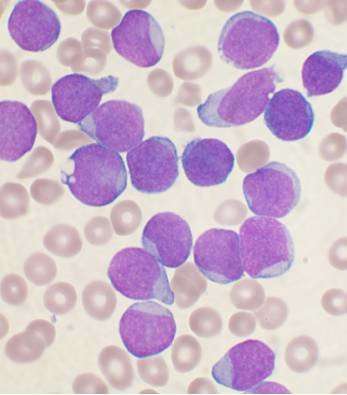Targeted treatment for leukemia approved on NHS in England

The targeted drug gilteritinib is now recommended for some adults with acute myeloid leukemia (AML) on the NHS in England. The National Institute for Health and Care Excellence (NICE) overturned their initial rejection of the drug, after new data and further analysis confirmed the therapy could be considered a life-extending treatment.
Targeted treatment
Gilteritinib works by blocking chemical signals that support cancer growth.
The targeted therapy will now be an option for adults with AML whose cancer tests positive for a particular DNA error in the FLT3 gene and has returned or is not responding to treatment. These cancers would usually be treated with chemotherapy.
In some cases, patients may go on to have a stem cell transplant after initial treatment. However, NICE has specified that patients should not receive gilteritinib after a stem cell transplant, as there is limited evidence that restarting gilteritinib after a stem cell transplant brings any further benefits if patients were already taking it before the transplant.
Clinical trials
In a clinical trial involving 371 patients, gilteritinib increased overall survival by close to 4 months when compared with standard chemotherapy.
People taking gilteritinib lived for 9.3 months on average, compared to 5.6 months for those on the standard treatment.
Patients also reported fewer serious side effects, indicating gilteritinib could support a better quality of life throughout treatment. It can also be taken at home, rather than as an inpatient treatment.
"Patients told NICE this targeted drug could improve their quality of life compared to existing chemotherapy options, and evidence from clinical trials suggests it may help some people survive their disease for longer too," said Samuel.
Approved
Following the initial rejection, the company that make gilteritinib provided updated data from the clinical trial and new data analysis. This meant NICE were more confident the drug offered value for money compared to existing treatment, and has enabled NICE to approve gilteritinib as a cost-effective treatment at the end of life.
However, NICE has noted that evidence of longer-term improvements in patients' survival remains uncertain.
Samuel said the decision would be welcomed as "good news" for people affected by this type of blood cancer.
NICE decisions are usually adopted in Wales and Northern Ireland as well as England, so the decision is likely to affect patients in all three nations. Scotland has a separate process for reviewing drugs.
More information: NICE (2020) Gilteritinib for treating relapsed or refractory acute myeloid leukemia. www.nice.org.uk/guidance/indev … id-ta10460/documents




















